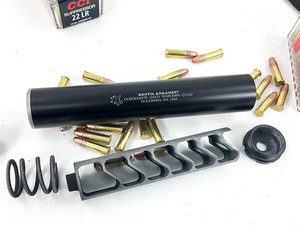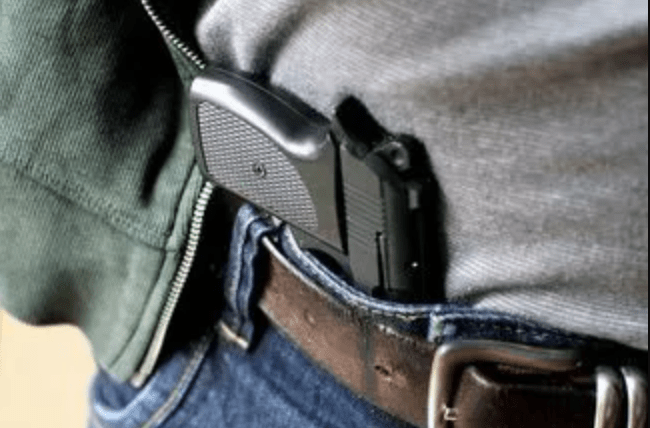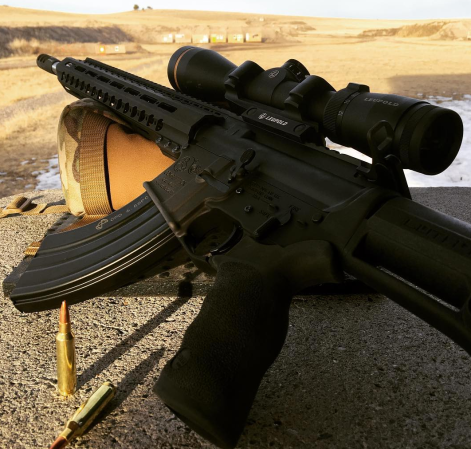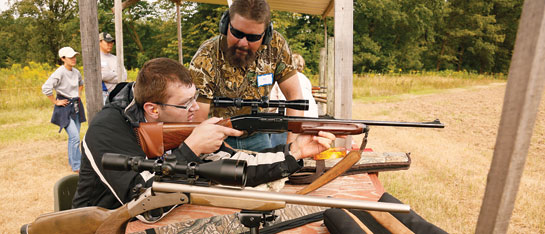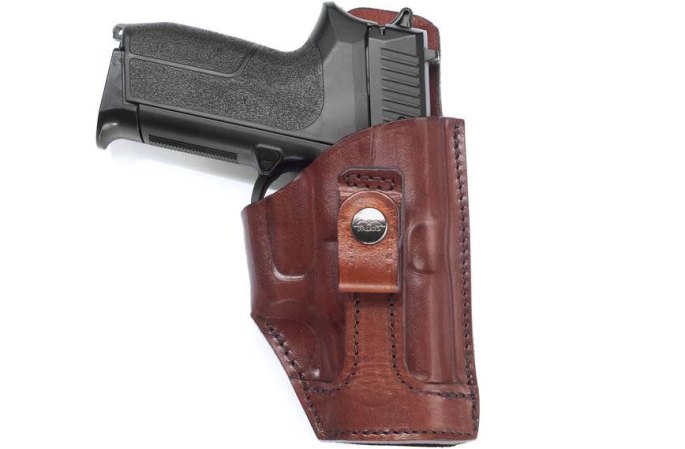We may earn revenue from the products available on this page and participate in affiliate programs. Learn More ›
TOP STORY
Keane: Citigroup Took Taxpayers Money, Now It Wants To Deny Taxpayers’ Constitutional Rights
The House Financial Services Committee’s recent hearing to scrutinize the nation’s largest banks and their practices after they received taxpayer dollars in the 2008 bailout featured some interesting comments by bank executives defending policies that discriminate against gun owners and the firearms manufacturing industry.
During the April 12 “Holding Megabanks Accountable: A Review of Global Systemically Important Banks 10 years after the Financial Crisis” hearing, Citigroup CEO Michael Corbat basically said imposing the institution’s ant-gun policy is a higher priority than wisely managing investors’ money.
In an April 18 Town Hall column, National Shooting Sports Foundation [NSSF] Senior Vice President of Government and Public Affairs and General Counsel Larry Keane applauded National Center Public Policy Research and Free Enterprise Project attorney Justin Danhof’s questioning of Corbat during the hearing.
It was gratifying to see Corbat and other banking executives “getting asked some hard questions about fiscal sanity of their decision to discriminate against firearms businesses” especially since “their answers aren’t likely to soothe investors,” Keane writes.
During the hearing, Danhof asked Corbat, “Can you tell us—your investors—exactly how much money we stand to lose because of this decision, and explain why you have this right while Warren Buffet has this wrong?”
Danhof was referring to Buffett’s 2018 explanation of why he refuses to impose his political views on investors in running Berkshire Hathaway in response to Andrew Ross Sorkin’s question during a CNBC interview about doing business with gun manufacturers.
“I don’t believe in imposing my political opinions on the activities of our businesses,” he said. “I don’t believe in imposing my views on 370,000 employees and a million shareholders. I’m not their nanny on that.”
Buffet is hardly a gun-rights supporter. He’s a board member of billionaire Michael Bloomberg’s Everytown for Gun Safety. He just sees it, “as bad business for unaccountable corporate C-Suites to dictate public policy,” Keane writes.
Corbat acknowledged Citigroup’s policy is to discriminate against firearms manufacturers and retailers who refuse to abide by their policy of instituting age-based gun bans, “deny a right to keep and bear arms by a legal adult,” Keane writes, and that the policy is not a Second Amendment threat but a “good practice.”
Corbat said they would only do business with retailers who conduct full background checks and no financing for companies that use loans to convert legal firearms into illegal firearms.
“If it sounds confusing, it’s because Corbat purposefully was aiming to do so,” Keane writes, noting all federally licensed firearms retailers are required by federal law to conduct an FBI background check at the point-of-sale before they can transfer a firearm to a consumer.
“This is done each and every time. This is not a ‘best practice,’ it’s the law which the industry supports,” he continues. “Also, no firearms manufacturers use any money–lent, invested or earned–to convert legal firearms into illegal ones. It’s a quick way lose a manufacturing license and head to prison.”
Citigroup’s anti-gun policies are hurting its investors, Keane said, noting Louisiana has barred Citigroup for competing for a $600 million road improvement project, “for interfering the lawful commerce-in-arms,” and U.S. Sen. Kevin Cramer, R-ND, and U.S. Rep. Roger Williams, R-Texas, have introduced the Freedom Financing Act (S. 821/H.R. 2019), which would prevent banks from accessing taxpayer-funded insurance if they institute discriminatory policies against the firearms industry.
“It’s time for banks to focus on banking and let voters weigh in on politics,” Keane states.
For more, go to:
— BANKS NOT SHOOTING STRAIGHT WITH TRUTH IN LENDING TO FIREARMS COMPANIES
— NRA Opposes Expansion of the Violence Against Women Act
— Second Amendment Sanctuary, Step by Step Guide to Make It Happen, Example Resolutions
— STATE’S Act: Trickiest consideration will be how this law affects possession of firearms
— 20 years after Columbine, Dems bullish on gun reform
— Columbine, 20 years later: Poll shows most Americans favor stricter gun laws
— Columbine Students Pledge Release of Death Photos for Gun Control
— What Gun Control Advocates Should Learn from the NRA
— New Interest in Gun Research: Are the Right People Paying Attention?
— The NRA convention is coming to Indianapolis. Here’s where it’s legal to carry a gun.
YOUR BUCKS BANG
NSSF: Gun-Makers Generate $52B Economic Impact, Employ 312K Americans
The total economic impact of the firearms and ammunition industry in the United States increased from $19.1 billion in 2008 to $52.1 billion in 2018, a 171-percent increase, according to the 2019 Firearms and Ammunition Industry Economic Impact Report posted by The National Shooting Sports Foundation’s [NSSF].
The NSSF’s annual “state of the state of the firearm’s industry” update documents that the total number of full-time equivalent jobs in the nation’s firearms manufacturing industry rose from approximately 166,000 in 2008 to almost 312,000 in 2018, an 88 percent increase over the span of a decade.
Between 2017 and 2018, the NSSF reports that the industry’s economic impact rose from $51.4 to $52.1 billion and total jobs increased from nearly 311,000 to almost 312,000 over that same year.
“Our industry is proud to be one of the steady and reliable producers and manufacturers in our economy as Americans continue to exercise their fundamental right to keep and bear arms and to safely enjoy the shooting sports,” NSSF CEO Stephen L. Sanetti said. “Our workforce is steadily adding good jobs to our local economies averaging $50,000 in wages and benefits.”
Sanetti said since 2008, firearms manufacturers have increased federal tax payments by 164 percent, Pittman-Robertson excise taxes that support wildlife conservation by 100 percent and state business taxes by 120 percent.
The Firearms and Ammunition Industry Economic Impact Report: 2019 provides a state-by-state breakdown of job numbers, wages and output covering direct, supplier and induced employment, as well as federal excise taxes paid. Access the full report here.
For more, go to:
— FIREARMS INDUSTRY ECONOMIC IMPACT ON THE RISE
— [Firearms and Ammunition Industry 2019 Economic Impact Report(https://www.nssf.org/government-relations/impact/)
— WalletHub: States most dependent on the firearms industry
— Sturm, Ruger Targeted by Activists Again
— Ruger Announces New Wrangler .22 LR Single-Action Revolver
— Take a Look at the SW1911 Gun: Smith & Wesson’s Very Own 1911 Pistol
— Questionable Strategy—Guns and the Uniform Trade Practices Act
— Why Is The ATF Making Secret Rules For The Firearms Industry?
STATE ROUNDUP
Florida Senate To Ponder Bill Expanding Armed School Guardian Program
The Florida Senate is scheduled to vote Tuesday on a wide-ranging school safety bill that features one controversial component: Allowing vetted, trained teachers with concealed weapons permits to volunteer for the state’s “guardian” program.
Senate Bill 7030 survived three heated hearings in committee review to qualify for Tuesday’s floor presentation less than two weeks before the legislative session concludes on May 3.
The House version—House Bill 7093—awaits third-reading adoption on the House floor
One prominent Democrat is suggesting a compromise amendment will be submitted on the Senate floor to exclude classroom teachers from the bill.
Sen. Perry Thurston, Jr., D-Lauderhill, told The Tampa Bay Times that chances were “60-40” an amendment to SB 7030 excluding classroom teachers from the guardian program could be introduced when it goes to the Senate floor.
Classroom teachers were excluded as a concession to Senate Democrats and reticent Republicans during the 2018 legislative session when the Legislature adopted SB 7026, the $400 million Marjory Stoneman Douglas School Safety Act, which was hastily assembled in the wake of the Valentine’s Day school shooting in Parkland.
SB 7026 earmarked $67 million for the guardian program but, according to a 458-page January report by the Marjory Stoneman Douglas School Safety Commission—created to ascertain how to best implement the Stoneman Douglas Act—only 25 school districts had opted to go with guardian program, using only $9.7 million to train 688 guardians.
Many districts would adopt the program if local law enforcement agencies provided the training, but under SB 7026, it was optional for sheriffs to do so. Many didn’t, citing liability concerns.
The commission suggested requiring sheriffs to provide training at a school board’s request and that volunteers undergo 144 hours of training, rigorous background check and physiological analysis to be vetted participants—and that teachers with concealed weapons permits be allowed to volunteer.
The commission’s proposals are encoded into SB 7030 and HB 7093. Under both bills, guardians would receive a $500 stipend and each must be appointed by a school superintendent or charter school principal.
SB 7030 includes the same guardian program expansion as HB 7093 does, but also boosts funding for student mental health services by $30 million.
The increase in school mental health money to $100 million was lauded by Democrats on the Senate Appropriations Committee April 11, but all cited the proposed guardian expansion in opposing SB 7030, approved in a contested 11-9 vote that advanced it to the floor.
“Overall, I think this is a really good bill,” said Sen. Bill Montford, D-Tallahassee, a former school superintendent. “The piece that I can’t embrace is the idea that more guns on campus makes it safer. I can’t get there at this point.”
The panel’s Democrats were joined by Miami Republican Sen. Anitere Flores in voting against SB 7030.
“There are more things that can go wrong than can go right” with armed classroom teachers, Flores said. “I hope that ultimately it will be a lot more good that comes from this than bad, but I firmly believe that our kids’ lives should be protected by more than just hope and, for that reason, I can’t vote for this bill today.”
For more, go to:
— Florida bills to arm teachers face House adoption, Senate challenge
— Alabama: Judiciary Committee hears mixed comments on concealed carry bill
— North Dakota House lawmakers back off concealed carry proposal
— Oregon: Legislature considers long list of gun laws
— Minnesota: Gabby Giffords Challenges the Gun Lobby’s Narrative With Responsible Gun Owners Group
— Iowa: Bill Would Allow Stun Guns On Public University & Community College Campuses
— Gun Grab Alert! Missouri Red Flag Bill Moving Forward
— Maryland: Brian Griffiths: House long gun bill was about criminalizing gun ownership
— Delaware Senate approves revised safe storage gun bill
— Illinois: ‘Sanctuary county’ movement expands as organizers take aim at new gun laws
— Nevada: County responds to gun control group’s info request
Read Next: Reauthorized ‘Red Flag’ Laws Lack Due Process for Gun Owners
IN THE COURTS
Bloomberg-Funded Everytown Challenges NRA’s Non-Exempt Tax Status
Former New York City Mayor and gun-control financier Michael Bloomberg’s front group has filed a complaint against the National Rifle Association [NRA] with the Internal Revenue Service [IRS] demanding a federal investigation into whether the advocacy group has violated its status as a non-profit organization.
“The NRA is a purported charity and exempt from federal tax under section 501(c)(4) of the Internal Revenue Code and we write today to alert you to what we believe are activities that clearly fall outside of the NRA’s charitable purpose and mission,” Everytown for Gun Safety said in a letter attached to their five-page complaint filed April 18 by Everytown’s Senior Counsel in Manhattan.
“We call on the IRS to commence an investigation into whether (i) the NRA has violated the federal laws governing 501(c)(4) charitable organizations, and (ii) if so, consider what remedies are warranted, including potential revocation of the NRA’s 501(c)(4) status,” the complaint reads.
Everytown filed the complaint after an April 17 article in The New Yorker claimed “a small group of NRA executives, contractors and venders has extracted hundreds of millions of dollars from the nonprofit’s budget, through gratuitous payments, sweetheart deals, and opaque financial arrangements.”
“The litany of red flags is just extraordinary,” Marc Owens, a former IRS official who oversaw tax-exempt enterprises at the agency, was quoted saying in The New Yorker. “
“Those facts, if confirmed, could lead to the revocation of the NRA’s tax-exempt status,” he said.
An NRA lawyer told The New Yorker that the group “has serious concerns about the accuracy of this reporting and The New Yorker’s sources. Of course, we cannot comment on privileged communications or personnel matters.”
Everytown said in its letter to the IRS that, “the NRA’s questionable business practices not only appear to stray from the norms and rules governing charities, but also threaten the financial health of the organization.”
In its letter, Everytown claims the NRA’s “501(c)(3) sister charitable organization,” the NRA Foundation, transferred $19.2 million and $18.8 million in tax deductible donations to the NRA’s Institute for Legislative Action [ILA], “a 501(c)(4) organization that engages in political activity,” in 2016 and 2017, respectively.
“On top of that,” Everytown continues, “the NRA’s most recent public disclosures, for 2017, revealed the NRA Foundation gave a $5 million loan to the NRA. The NRA reportedly laid off several employees, including some associated with its NRA TV product.”
For more, go to:
— Secrecy, Self-Dealing, and Greed at the NRA
— Gun control group files complaint over NRA’s tax-exempt status
— NRA’s Dirty Laundry Exposed as Pro-Gun Group Cleans House
— Families of Mass Shooting Victims Win a $2 Million Court Battle
— Conversation with Brian Wrenn of the Wrenn v. District of Columbia Case
— Multimillion-Dollar Settlement Reached In Kansas Gun Store Negligence Lawsuit
— NRA SEEKS TO STOP PITTSBURGH GUN BAN AS LAWSUITS HEAD TO COURT
— Bump stock’ lawsuit argues for just compensation from gov’t

